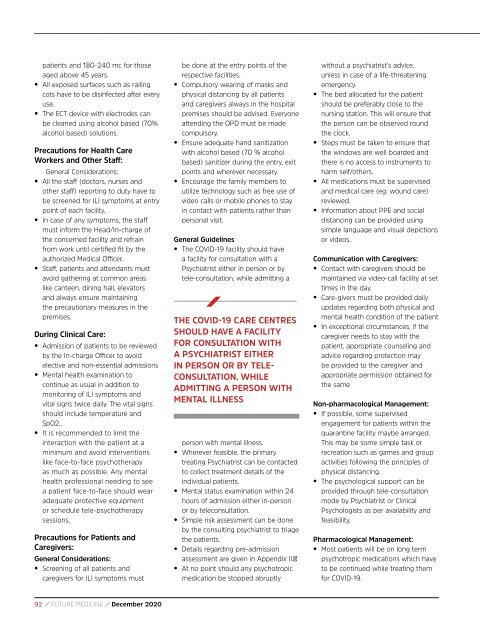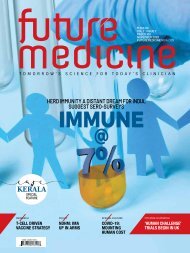You also want an ePaper? Increase the reach of your titles
YUMPU automatically turns print PDFs into web optimized ePapers that Google loves.
patients and 180-240 mc for those<br />
aged above 45 years.<br />
• All exposed surfaces such as railing<br />
cots have to be disinfected after every<br />
use.<br />
• The ECT device with electrodes can<br />
be cleaned using alcohol based (70%<br />
alcohol based) solutions.<br />
Precautions for Health Care<br />
Workers and Other Staff:<br />
General Considerations:<br />
• All the staff (doctors, nurses and<br />
other staff) reporting to duty have to<br />
be screened for ILI symptoms at entry<br />
point of each facility.<br />
• In case of any symptoms, the staff<br />
must inform the Head/In-charge of<br />
the concerned facility and refrain<br />
from work until certified fit by the<br />
authorized Medical Officer.<br />
• Staff, patients and attendants must<br />
avoid gathering at common areas<br />
like canteen, dining hall, elevators<br />
and always ensure maintaining<br />
the precautionary measures in the<br />
premises.<br />
During Clinical Care:<br />
• Admission of patients to be reviewed<br />
by the In-charge Officer to avoid<br />
elective and non-essential admissions<br />
• Mental health examination to<br />
continue as usual in addition to<br />
monitoring of ILI symptoms and<br />
vital signs twice daily. The vital signs<br />
should include temperature and<br />
SpO2,.<br />
• It is recommended to limit the<br />
interaction with the patient at a<br />
minimum and avoid interventions<br />
like face-to-face psychotherapy<br />
as much as possible. Any mental<br />
health professional needing to see<br />
a patient face-to-face should wear<br />
adequate protective equipment<br />
or schedule tele-psychotherapy<br />
sessions.<br />
Precautions for Patients and<br />
Caregivers:<br />
General Considerations:<br />
• Screening of all patients and<br />
caregivers for ILI symptoms must<br />
be done at the entry points of the<br />
respective facilities.<br />
• Compulsory wearing of masks and<br />
physical distancing by all patients<br />
and caregivers always in the hospital<br />
premises should be advised. Everyone<br />
attending the OPD must be made<br />
compulsory.<br />
• Ensure adequate hand sanitization<br />
with alcohol based (70 % alcohol<br />
based) sanitizer during the entry, exit<br />
points and wherever necessary.<br />
• Encourage the family members to<br />
utilize technology such as free use of<br />
video calls or mobile phones to stay<br />
in contact with patients rather than<br />
personal visit.<br />
General Guidelines<br />
• The COVID-19 facility should have<br />
a facility for consultation with a<br />
Psychiatrist either in person or by<br />
tele-consultation, while admitting a<br />
THE COVID-19 CARE CENTRES<br />
SHOULD HAVE A FACILITY<br />
FOR CONSULTATION WITH<br />
A PSYCHIATRIST EITHER<br />
IN PERSON OR BY TELE-<br />
CONSULTATION, WHILE<br />
ADMITTING A PERSON WITH<br />
MENTAL ILLNESS<br />
person with mental illness.<br />
• Wherever feasible, the primary<br />
treating Psychiatrist can be contacted<br />
to collect treatment details of the<br />
individual patients.<br />
• Mental status examination within 24<br />
hours of admission either in-person<br />
or by teleconsultation.<br />
• Simple risk assessment can be done<br />
by the consulting psychiatrist to triage<br />
the patients.<br />
• Details regarding pre-admission<br />
assessment are given in Appendix II.<br />
• At no point should any psychotropic<br />
medication be stopped abruptly<br />
without a psychiatrist’s advice,<br />
unless in case of a life-threatening<br />
emergency.<br />
• The bed allocated for the patient<br />
should be preferably close to the<br />
nursing station. This will ensure that<br />
the person can be observed round<br />
the clock.<br />
• Steps must be taken to ensure that<br />
the windows are well boarded and<br />
there is no access to instruments to<br />
harm self/others.<br />
• All medications must be supervised<br />
and medical care (eg: wound care)<br />
reviewed.<br />
• Information about PPE and social<br />
distancing can be provided using<br />
simple language and visual depictions<br />
or videos.<br />
Communication with Caregivers:<br />
• Contact with caregivers should be<br />
maintained via video-call facility at set<br />
times in the day.<br />
• Care-givers must be provided daily<br />
updates regarding both physical and<br />
mental health condition of the patient<br />
• In exceptional circumstances, if the<br />
caregiver needs to stay with the<br />
patient, appropriate counseling and<br />
advice regarding protection may<br />
be provided to the caregiver and<br />
appropriate permission obtained for<br />
the same<br />
Non-pharmacological Management:<br />
• If possible, some supervised<br />
engagement for patients within the<br />
quarantine facility maybe arranged.<br />
This may be some simple task or<br />
recreation such as games and group<br />
activities following the principles of<br />
physical distancing.<br />
• The psychological support can be<br />
provided through tele-consultation<br />
mode by Psychiatrist or Clinical<br />
Psychologists as per availability and<br />
feasibility.<br />
Pharmacological Management:<br />
• Most patients will be on long term<br />
psychotropic medications which have<br />
to be continued while treating them<br />
for COVID-19.<br />
92 / FUTURE MEDICINE / <strong>December</strong> <strong>2020</strong>

















